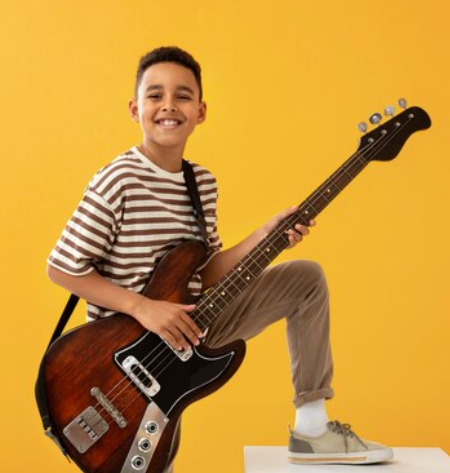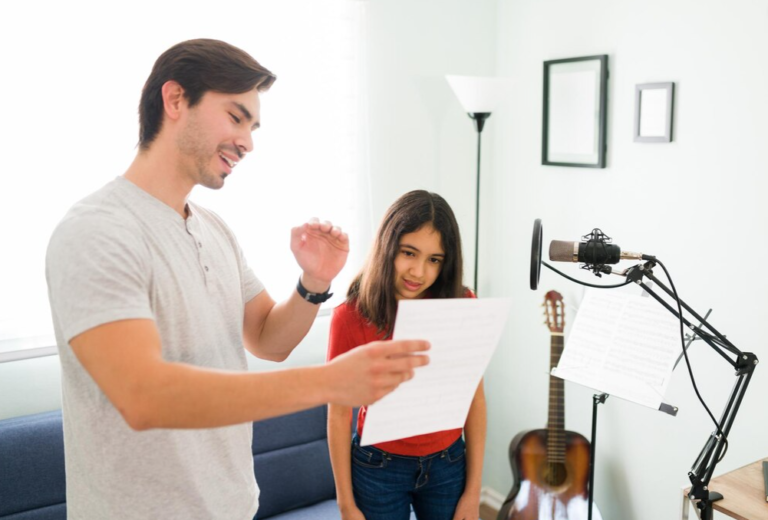10 Guaranteed Tips To Make Your Child To Practice Music

To motivate your child to practice music or their musical instrument regularly can often seem like a daunting task. With the demands of school, various after-school activities, and the tempting distractions of digital screens, it can be tough for children to find both the time and the drive to focus on music. Nonetheless, by adopting the correct strategies, you can help your child develop a genuine passion for their musical endeavors.
Below are some practical tips to motivate your child to practice music without any problem:
Motivation 1: Establish Attainable Objectives
As part of the goal of how to motivate your child to practice music, you can begin by determining realistic targets tailored to your child’s age and proficiency. These can range from short-term objectives like mastering a new song to long-term ambitions such as gearing up for a recital or an examination. Acknowledge and celebrate each achievement to foster a feeling of success.
Motivation 2: Create a Consistent Schedule
Maintaining a routine is crucial for skill development so, collaborate with your child to set up a practice timetable that integrates smoothly into their daily activities. The sessions don’t need to be extensive; even 15-30 minutes of concentrated practice can be effective, particularly for younger kids. Remember, short but consecutive practice sessions will motivate your child to practice music without problems.
Motivation 3: Foster a Supportive Practice Space
Make sure your child has a cozy and undisturbed area for their practice sessions. This means providing a high-quality instrument, sufficient lighting, and a tranquil space. A welcoming atmosphere can make practicing more enjoyable.
Motivation 4: Enhance Practice Enjoyment
Maintain engagement during practice sessions by mixing in different activities. Your options might include playing with background recordings, improvising, or utilizing music apps and games that promote learning. Diversifying activities helps prevent the practice from becoming tedious.
Motivation 5: Include Them in Choosing the Music
There´s nothing that kids can hate the most than forcing your children to do something they don’t like, so, to motivate your child to practice music let him/her participate in selecting the music they practice. Although adhering to a structured curriculum is essential, occasionally letting them pick pieces that excite them can greatly enhance their enthusiasm.
Motivation 6: Apply Positive Encouragement
Showing excitement and support will always motivate your child to practice music so, another tip is to recognize their efforts and achievements, even the minor ones. Positive reinforcement can foster confidence and a passion for music.
Motivation 7: Set a Good Example
If you have musical skills or play an instrument yourself, occasionally join your child during their practice sessions. Demonstrating your own commitment to music and practice can be highly inspiring for them.
Motivation 8: Promote Social Engagement
Music tends to be more enjoyable when shared with friends. Motivate your child to get involved in group classes, ensembles, or music-related clubs. Experiencing music with others can offer a feeling of community and additional encouragement.
Motivation 9: Experience Live Music Together
Taking your child to live music events can be a great source of inspiration. Whether it’s attending a professional concert or a local school performance, watching musicians perform live can be highly motivating and informative.
Motivation 10: Show Patience and Support
Mastering an instrument is a process filled with challenges and achievements. There will be times when your child may not feel like practicing. During these moments, it’s crucial to be empathetic and supportive rather than coercive.
Motivating your child to practice their musical instrument involves creating a nurturing and fun educational atmosphere. By setting achievable objectives, crafting a consistent practice schedule, and keeping practice sessions lively, you can nurture a deep-seated affection for music in your child. The goal is to motivate rather than coerce. With understanding and positive reinforcement, your child is more apt to engage with and enjoy their musical pursuits.
If you’re interested in learning an instrument, at Real Brave, we offer an incredible experience like no other place in music lessons for kids and adults by guiding them from the beginning stages of getting to know an instrument all the way through performing for family and friends on stage. Our instructors come from all over the world, bringing extensive experience on a wide range of instruments. Click below and book a free lesson with us!
Author: Daniel Powers Jr, the founder of Real Brave™, serves as the chief inspiration to thousands of students in the Real Brave music instruction program. He’s also the visionary behind PracticePad™, an online platform for live one-on-one online music lessons, lesson tracking, and scheduling. Beyond his entrepreneurial pursuits, Daniel leads a non-profit organization that provides formerly homeless children with access to music education, making a profound impact on their lives. His unwavering dedication to music, innovation, and education continues to inspire individuals to reach their fullest potential while creating positive change in communities. Follow Real Brave on all the socials:
youtube.com/@realbraveinc
twitter.com/realbraveinc
instagram.com/realbraveaudio
facebook.com/realbraveinc






